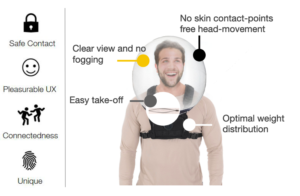Previous Projects
Each semester the teams are confronted with a new challenge.
See the leitmotifs of the last semesters and what the teams came up with…
Winter 23 How can we ensure human-friendly interactions with robots in everyday life?
Coordinate Trainer by J. Eigenmann, S. Henn, L. Hopmeier, S. Hundsdorfer, F. Maghrebi
Our Coordinate Trainer is a tool designed specifically for inexperienced workers. It provides an immersive and forgiving environment for learning 3D movement, coordinates, and button positions. It’s both inexpensive and robust, crafted to be used without supervision. The control panels are inspired by those you’ll find on existing robots, making the transition smoother than ever.

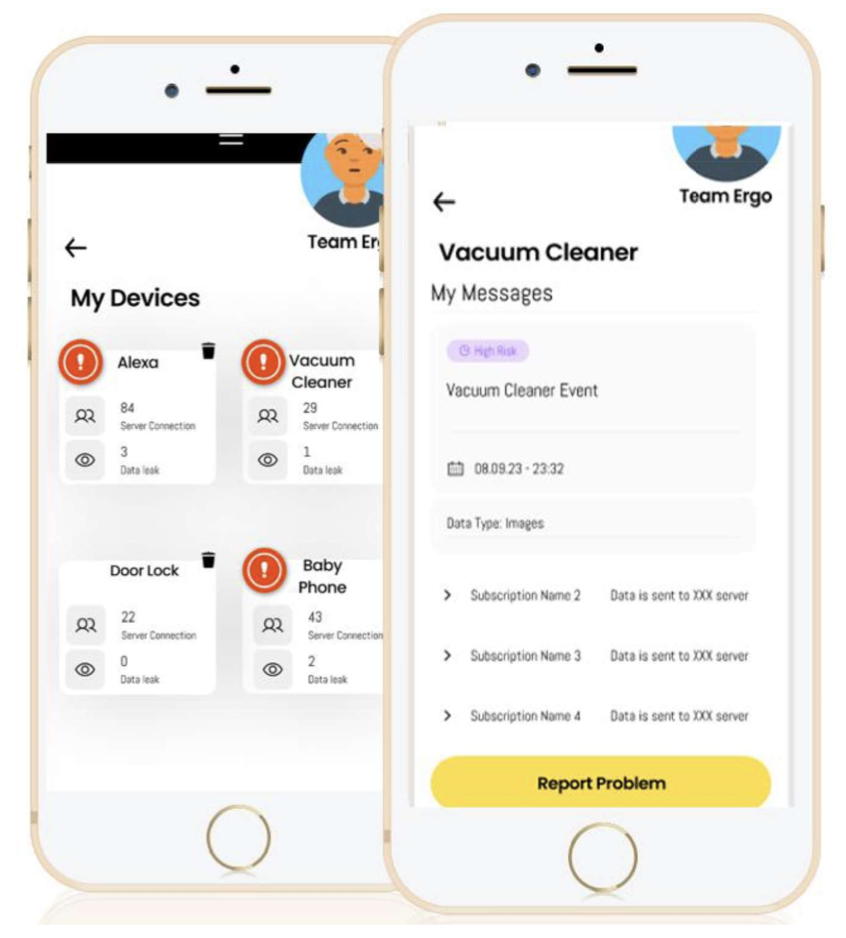
RoboCookies - Transparent Voices, Smarter Choices by S. Lyu, F. A. Ivan, M. A. Bouafif, B. Balci, D. A. Gundogan
Manufacturers have rarely been transparent about what and when data is being collected by Robots. RoboCookies aims to solve this by providing “proceeding with technical cookies” functionality to robots just as found while browsing websites online. Monitor how and when your smart robots and devices collect and transfer data. Disconnect them from the internet at inopportune times and also report likely sensitive data to be erased from the manufacturers’ end.
Summer 23 How can we create a greater sense of community in the School of Engineering and Design?
TUM What’s up? by I. Broda, S. Jahn, L. Morlock, F. Poller, F. Rothgängel
Initially, we needed to identify a concrete problem aligned with the Leitmotif. We found that student groups play a significant role, and simplifying access to extracurricular activities was crucial to enhance engagement across student groups and thereby improve the overall school community. In response, we designed an innovative information platform that addressed this challenge comprehensively, considering the needs of students, student groups, and TUM officials. By facilitating better information sharing and communication, our platform can foster engagement and elevate the sense of community within the school and the university.
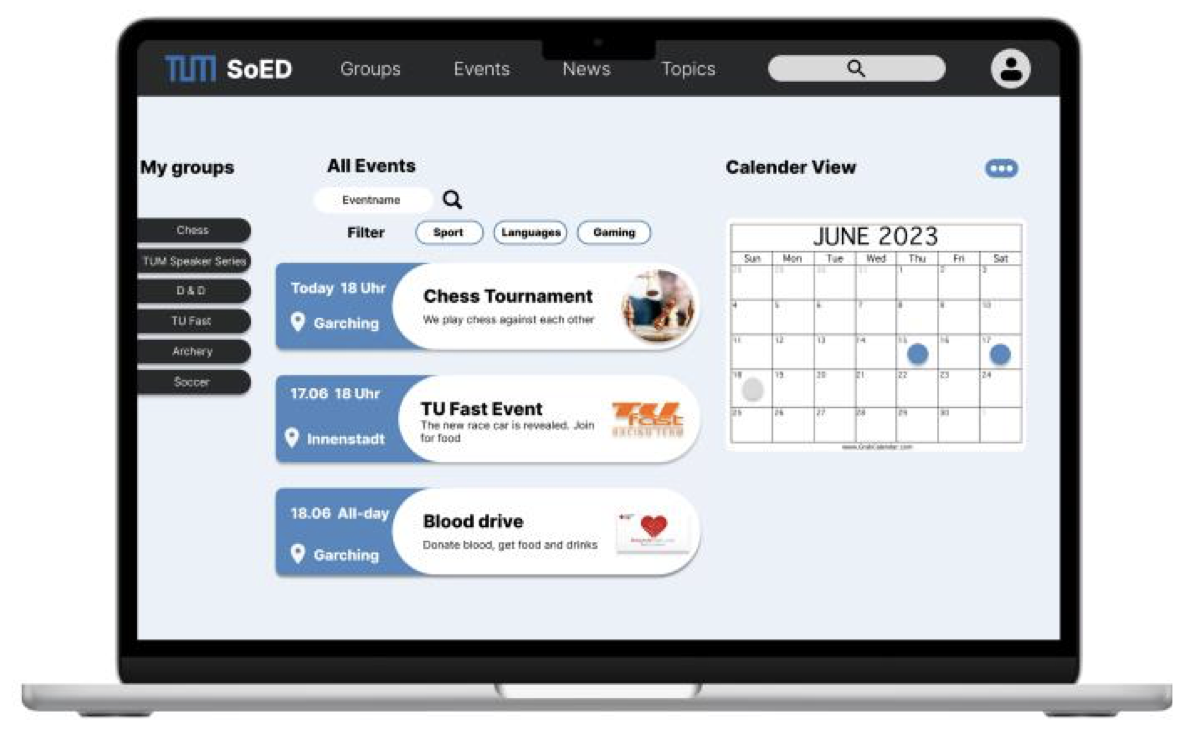
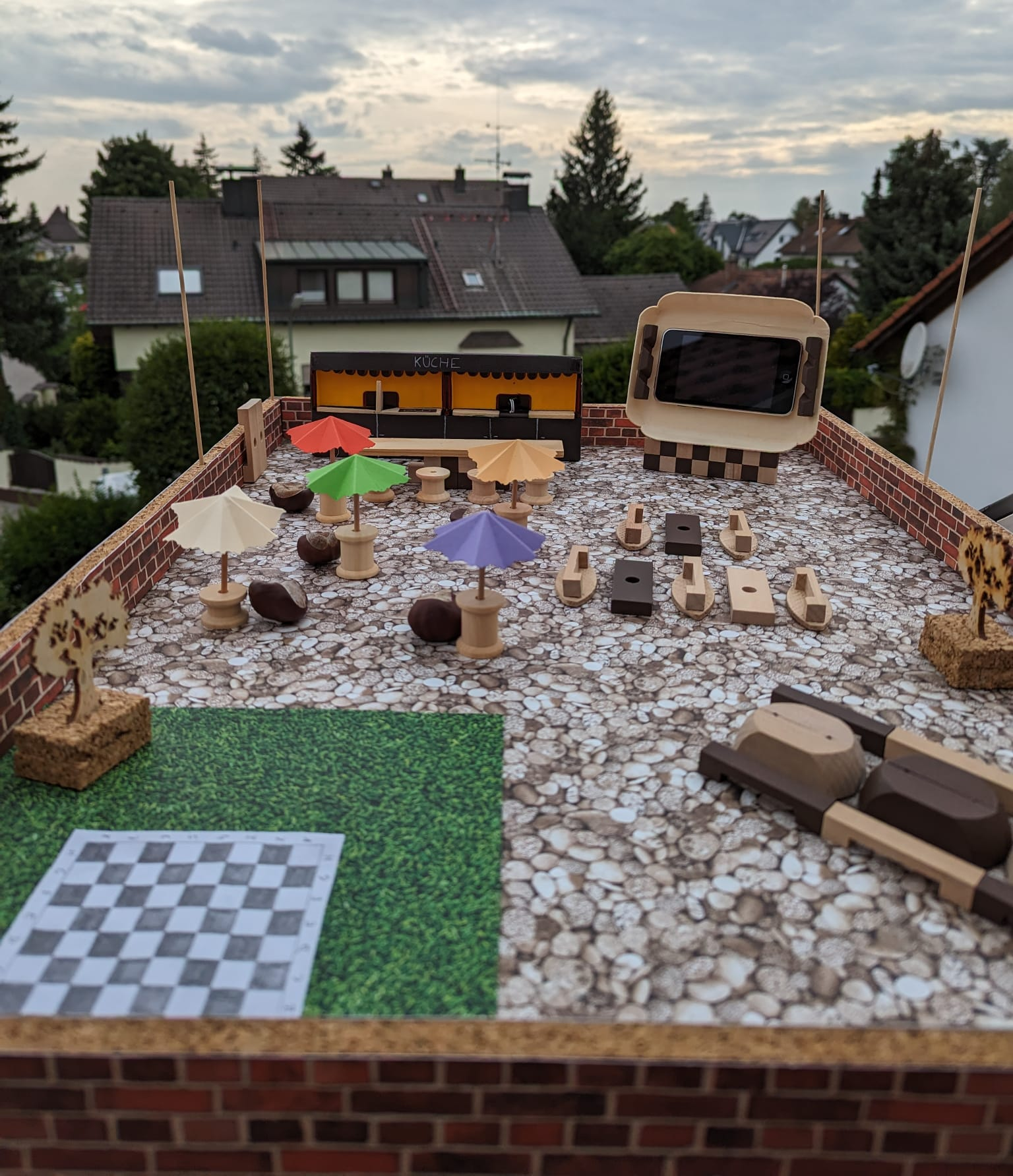
Roofunity - community at new heights by A. Aloui, C. Shinde, J. Grund, P. Goldbrunner, Y. Ben Kamel
Providing places to members of the School and fostering interactions between members are vital elements to building a stronger sense of community within the School of Engineering and Design. ‘RoofUnity’ is a new social space experience developed by students for students that enhances the social life and diversifies the campus experience. As the name says it is a rooftop area which is open to all members of the School of Engineering and Design and provides good incentives for social interaction and interesting meet ups through various feature elements. Including a virtual campus portal linking multiple campuses together and a mystery match table to quickly get to know new people in a fitting environment.
Winter 22 How can we make life more inclusive for the physically impaired?
ShopAssist by S. Haysal, L. Huber, E. Islertas, E. Strochkova, S. Tauscher
The grocery store as a place of inclusivity? Yes!
ShopAssist aims to enable Visually Impaired People to go grocery shopping on-site more flexibly. Providing an overview of time slots with guaranteed assistance offered by the
supermarket enables getting the shopping experience in stores, without having to strictly schedule dates with family or friends. The time slots are expanded by volunteers adding bookable meetings or by users directly requesting assistance from volunteers at the desired time. A helping hand whenever needed.
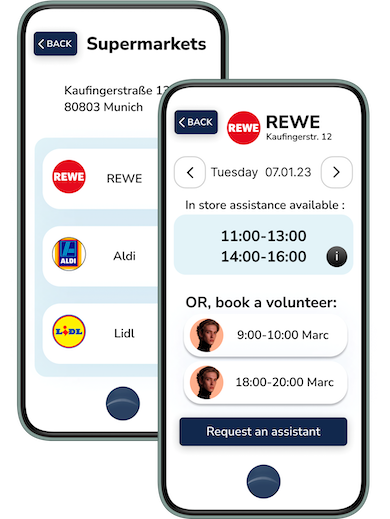
Summer 22 How can we make life at campus more ecologically sustainable?

The EcoZoid by F. Elfering, L. Kierblewski, T. Merkel, A. Sözbir, E. Yolcu
Every year more and more students are attending TUM, and what are they doing? They are spending most of their time on campus studying indoors. We present to you the EcoZoid, an alternative sustainable solution to expand the number of study spaces on campus with a new outdoor learning environment. The EcoZoid is modular, each of the trapezoidal shaped modules can be arranged to perfectly fit the space it is intended for. The EcoZoid can create areas meant for studying alone with privacy or in groups where you can talk without disturbing others. Need a study break? There’s an area for that as well. A focus on sustainable materials, renewable energy, reuse of modules, optimized manufacturing and transport all come together to create this new sustainable place to study.
CurTUM by F. Braunmühl, C. Hauenstein, O. Beck, T. Lozancic, L. Voß
FC OTL completed the IDP-X in the summer semester 2022. We followed the given Human- centered Design process with the Leitmotif “How can we make life at campus more ecologically sustainable?” With increasing knowledge of the topic of sustainability, which we gained through numerous interviews with sustainability departments and the opinions of students, our final prototype CurTUM evolved.
A new product that combines the benefits of regular blinds, indoor plants and exterior façade greening. With its insulation and cooling effects as well as its capability to be installed at basically any window, it is scalable and can have a real impact on the import topic of sustainability on campus.
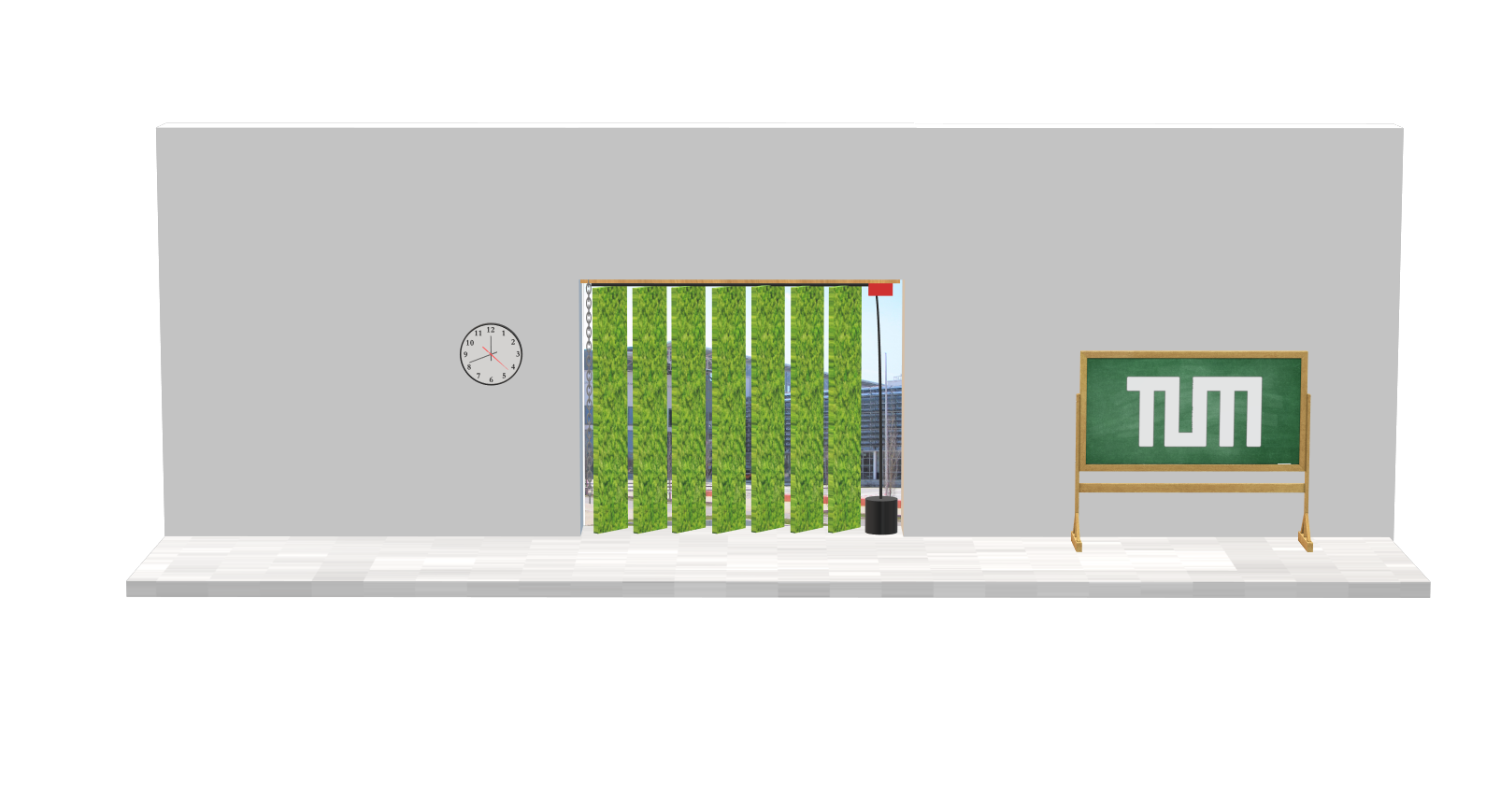
Winter 21 Healthy Lifestyle: Building an artifact that helps to reduce stress.
The Window Waker by P. Medl, Y. Ben Yahia, L. Mummenbrauer, N. Schwanke, N. Zbil and S. Ferrari
Enjoy a novel wake up experience! Window Waker tackles unhealthy morning habits such as snoozing and excessive phone usage by offering an innovative solution to start your morning. The product combines multiple devices to create a soft and smooth wake up routine with gentle nature sounds and an adjustable light source. To stop your alarm, you have to manually open your bedroom window by a proximity sensor. Fresh air now flows through your room, as Window Waker automatically switches to your personal mindful activity to start into the day.
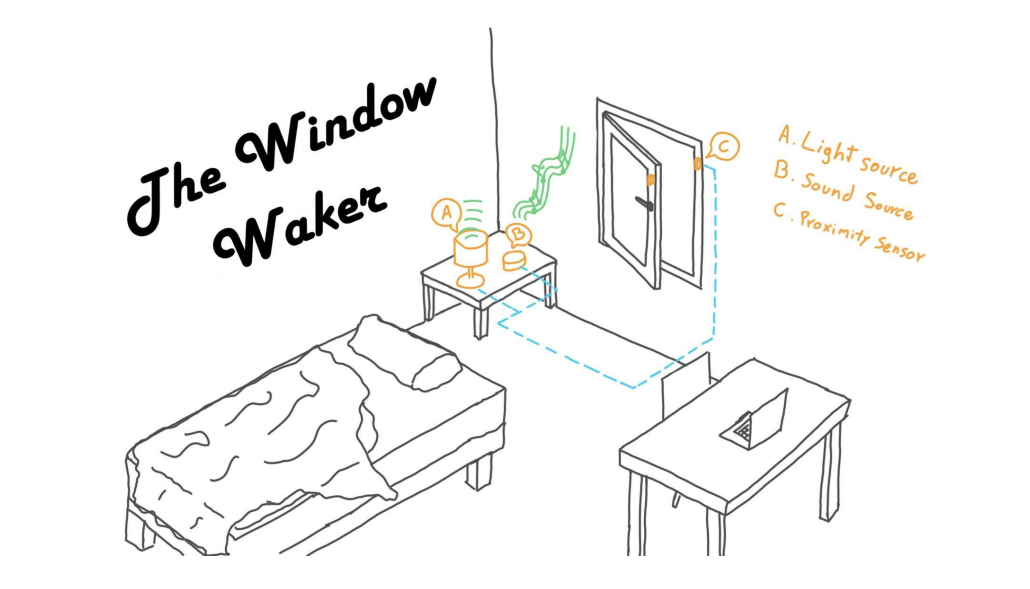
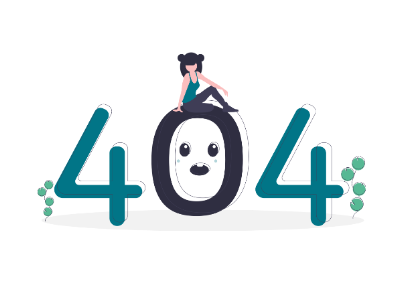
ConnecTable by C. Panozzo, H. Arora, J. Christiansen, D. Stolz and L. Arndt
In our globalized world, there are many people who are separated from close friends and family members by great distances. ConnecTable is a concept for a service that would enable these people – couples in long distance relationships as well as families separated by travel restrictions – to meet in a virtual space and enjoy a meal together with the same level of immersion that an in person meeting would offer.
The concept envisions interconnected restaurants all over the world, allowing people to visit the venue regardless of where they are located. In the restaurants, customers sit down at individual booths with large screens and connect to their contacts on the other side.
Key to the development of ConnecTable was making use of an iterative design process and incorporating user feedback to judge how people experience the concept. The ultimate goal was to ensure a stress reduction potential by enabling engaging long distance social interactions through technology.
Night Cube by D. Hindahl, J. You, M. Zinnecker, R. Kobiella and C. Dichtl
The Night Cube is a product that helps in falling asleep and waking up more naturally to reduce the stress level. Enjoy a starry sky projection in your bedroom, listen to relaxing meditation sound or a bedtime story before going to bed. The Night Cube is equipped with a smart wake up alarm which simulates the sunrise. It detects the users’ sleep cycle and begins the wake-up process depending on the users’ circadian rhythm. Say goodbye to restless nights and groggy mornings!
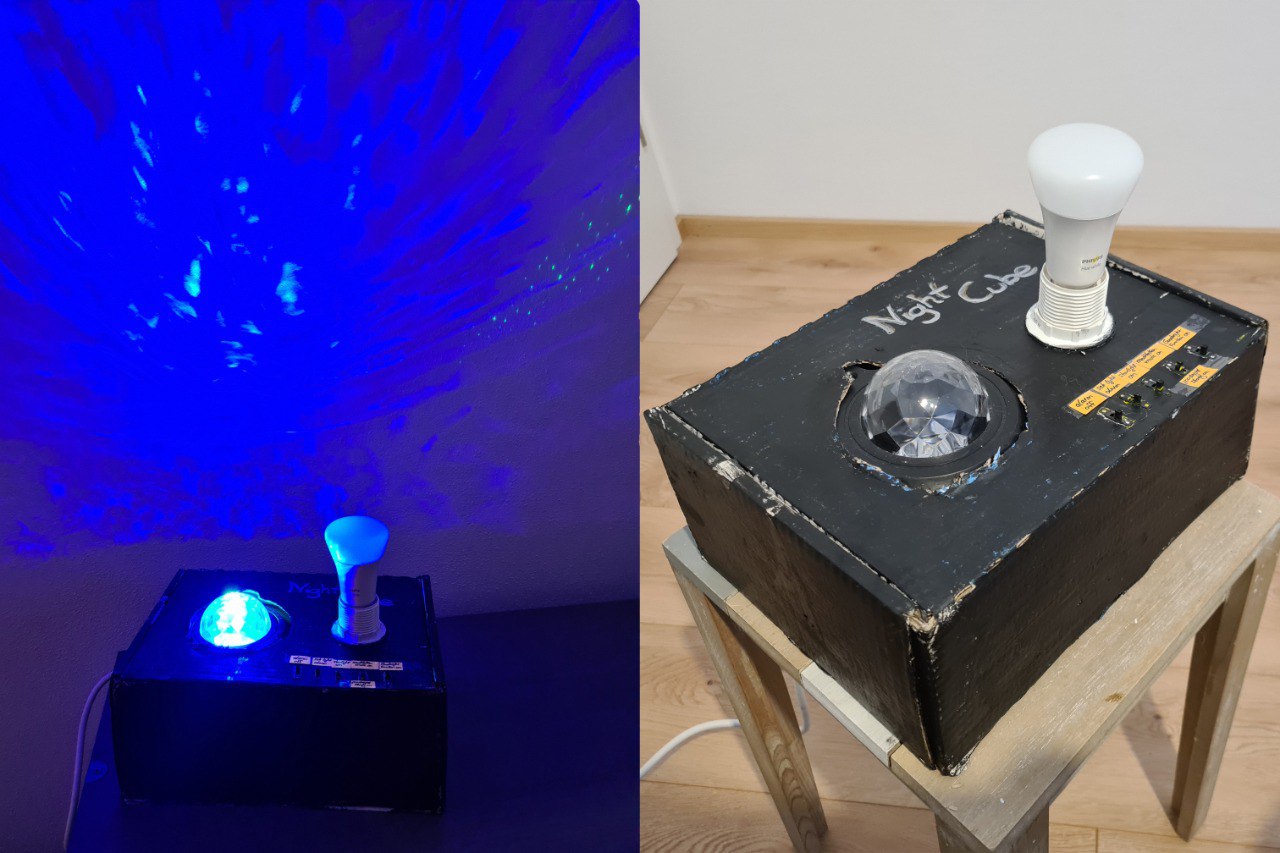
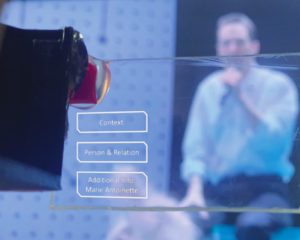 Culturaid is a product that helps visitors of a theatre play to understand the play and get back on track if they got lost during the play. To do that, Culturaid provides valuable information in a scene through augmented reality to the users without distracting them from the play. The users can decide when they need this help and Culturaid will support them, aiming at their understanding.
Culturaid is a product that helps visitors of a theatre play to understand the play and get back on track if they got lost during the play. To do that, Culturaid provides valuable information in a scene through augmented reality to the users without distracting them from the play. The users can decide when they need this help and Culturaid will support them, aiming at their understanding. 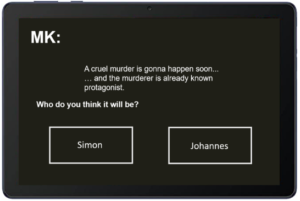 The ‘Interactive System by AirBROnomics’ is a new concept that enables
The ‘Interactive System by AirBROnomics’ is a new concept that enables 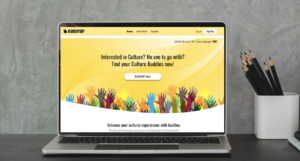 BuddyUp is a website, which gives users the opportunity to buy a ticket for their favourite cultural event with the addition of getting matched to a buddy or a group who will join them. This enables theatre visitors, who would visit the play on their own, to enjoy culture in a like-minded group.
BuddyUp is a website, which gives users the opportunity to buy a ticket for their favourite cultural event with the addition of getting matched to a buddy or a group who will join them. This enables theatre visitors, who would visit the play on their own, to enjoy culture in a like-minded group.  AIM is an initiative, which conducts school programs to teach children that they are capable of carrying out any job, independent of their gender. Therefore pupils are presented non-gender stereotypical role models by companies, which provide active, enthusiastic and passionate role models, who work in non-gender stereotypical job positions.
AIM is an initiative, which conducts school programs to teach children that they are capable of carrying out any job, independent of their gender. Therefore pupils are presented non-gender stereotypical role models by companies, which provide active, enthusiastic and passionate role models, who work in non-gender stereotypical job positions. 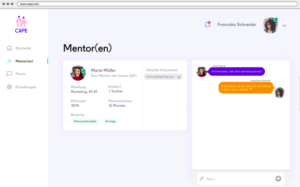 CAPE aims to equalise opportunities at the workplace through information and empathy in one of the most important phases of many working lives: having children. The idea therefore is to connect expectant mothers or fathers with other parents from the same organisation on the topic of parental leave. The service is designed in order to help each other with questions of any kind, be it organisational, emotional or financial, and to learn from each other by sharing experiences that go beyond online guides or more impersonal mentoring offers.
CAPE aims to equalise opportunities at the workplace through information and empathy in one of the most important phases of many working lives: having children. The idea therefore is to connect expectant mothers or fathers with other parents from the same organisation on the topic of parental leave. The service is designed in order to help each other with questions of any kind, be it organisational, emotional or financial, and to learn from each other by sharing experiences that go beyond online guides or more impersonal mentoring offers.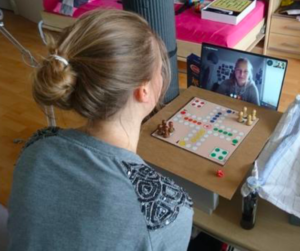 Since personal contact has become rare in the pandemic situation, the boardgame “Ghostfriend” provides an innovative solution.The
Since personal contact has become rare in the pandemic situation, the boardgame “Ghostfriend” provides an innovative solution.The